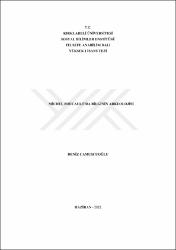| dc.contributor.advisor | Dağ, Ahmet | |
| dc.contributor.author | Camuşcuoğlu, Deniz | |
| dc.date.accessioned | 2021-12-11T19:41:41Z | |
| dc.date.available | 2021-12-11T19:41:41Z | |
| dc.date.issued | 2021 | |
| dc.identifier.uri | https://tez.yok.gov.tr/UlusalTezMerkezi/TezGoster?key=v7BkNnnepTnbhn8rNR77LbMjsFFmej9vkaBdNaONukZQloxZAq33pEKy0ttWTrJ8 | |
| dc.identifier.uri | https://hdl.handle.net/20.500.11857/1532 | |
| dc.description | YÖK Tez: 689437 | |
| dc.description.abstract | Arkeolojik çözümleme yöntemiyle bilinen Michel Foucault, 20.yy Batı felsefesinin etkili düşünürlerinden biridir. Onun felsefi etkinliği 1954'ten 1984 yılına kadar otuz yıllık bir süreci kapsarken; araştırmaları arkeoloji ve soykütüğü olarak iki ana başlık altında incelenebilir. Arkeolojik araştırma, tarih boyunca söylemlerde beliren bilginin oluşum koşullarının betimlenmesidir. Soykütüksel araştırma ise iktidar mekanizmalarının çözümlemesinde kullanılan bir karşı-bilimi niteler. Ancak iki araştırma birbirinden bağımsız olmayan Foucault'nun felsefi etkinliğinin bütünsel gelişimleridir. Geleneksel felsefenin bilgi, bilme ve istenç birliğini reddeden Foucault; dil ile gerçeklik, episteme olarak bilgi ve bilme olarak bilgi ayrımı yapar. Tarihsel süreksizliklerde arkeolojinin ortaya koyduğu epistemeler, farklı çağları oluştururken; bu çağların söylemlerinin koşulları bilme olarak bilgiyi verir. Soykütüksel analiz ise iktidar/bilgi pratiğinin, iktidarın dayatma ve bireyselleştirme mekanizmalarının koşullarını ortaya çıkartır. Çalışmamız çağertesi filozof Michel Foucault'nun arkeolojik söylem analizini betimlemeye çalışacaktır. | |
| dc.description.abstract | With his archaeological analysis method, Michel Foucault is one of the influential thinkers of 20th century Western philosophy. While his philosophical activity covered a period of thirty years from 1954 to 1984; research can be examined under two main headings as archeology and genealogy. Archaeological research is the description of the formation conditions of knowledge appearing in discourses throughout history. Genealogical research characterizes a counter-science used in the analysis of power mechanisms. However, the two works are not independent of each other, they are developments of Foucault's works from one place. Foucault, who rejects the unity of knowledge, knowing and will of traditional philosophy; distinguishes between language and reality, knowledge as episteme, and knowledge as knowing. While the epistemes revealed by archeology in historical discontinuities constitute different eras; The conditions of the discourses of these ages give knowledge as knowing. Genealogical analysis reveals the conditions of power/knowledge practice, mechanisms of imposition and individualization of power. Our study will try to describe the archaeological discourse analysis of the postmodern philosopher Michel Foucault. | |
| dc.language.iso | tur | |
| dc.publisher | Kırklareli Üniversitesi | |
| dc.rights | info:eu-repo/semantics/openAccess | |
| dc.subject | Felsefe | |
| dc.subject | Philosophy | |
| dc.subject | Foucault | |
| dc.subject | Arkeoloji | |
| dc.subject | Soykütüğü | |
| dc.subject | Episteme | |
| dc.subject | Bilgi | |
| dc.subject | İktidar. | |
| dc.subject | Foucault | |
| dc.subject | Archeology | |
| dc.subject | Genealogy | |
| dc.subject | Episteme | |
| dc.subject | Knowledge | |
| dc.subject | Power. | |
| dc.title | Michel Foucault'da bilginin arkeolojisi | |
| dc.title.alternative | Archeology of knowledge in Michel Foucault | |
| dc.type | masterThesis | |
| dc.department | Enstitüler, Sosyal Bilimler Enstitüsü, Felsefe Ana Bilim Dalı | |
| dc.identifier.startpage | 1 | |
| dc.identifier.endpage | 145 | |
| dc.relation.publicationcategory | Tez | |
| dc.institutionauthor | Camuşcuoğlu, Deniz | |



















